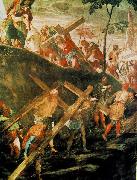Wholesale Oil Painting No Minimum |
|||||||||||
|
|
|||||||||||

|
|||||||||||
|
|
|
||||||||
TintorettoItalian Mannerist Painter, ca.1518-1594 His father was a silk dyer (tintore); hence the nickname Tintoretto ("Little Dyer"). His early influences include Michelangelo and Titian. In Christ and the Adulteress (c. 1545) figures are set in vast spaces in fanciful perspectives, in distinctly Mannerist style. In 1548 he became the centre of attention of artists and literary men in Venice with his St. Mark Freeing the Slave, so rich in structural elements of post-Michelangelo Roman art that it is surprising to learn that he had never visited Rome. By 1555 he was a famous and sought-after painter, with a style marked by quickness of execution, great vivacity of colour, a predilection for variegated perspective, and a dynamic conception of space. In his most important undertaking, the decoration of Venice's Scuola Grande di San Rocco (1564 C 88), he exhibited his passionate style and profound religious faith. His technique and vision were wholly personal and constantly evolving. |
||||||||
|
|
||||||||
The Ascent to Calvary
The Ascent to Calvary Painting ID:: 32658 |
1566-67
Oil on canvas, 515 x 390 cm 1566-67 Oil on canvas, 515 x 390 cm |
|||||||
|
|
||||||||
|
James Ensor Belgian 1860-1949 Belgian painter, printmaker and draughtsman. No single label adequately describes the visionary work produced by Ensor between 1880 and 1900, his most productive period. His pictures from that time have both Symbolist and Realist aspects, and in spite of his dismissal of the Impressionists as superficial daubers he was profoundly concerned with the effects of light. His imagery and technical procedures anticipated the colouristic brilliance and violent impact of Fauvism and German Expressionism and the psychological fantasies of Surrealism. Ensor most memorable and influential work was almost exclusively produced before 1900, but he was largely unrecognized before the 1920s in his own country. His work was highly influential in Germany, however: Emil Nolde visited him in 1911, and was influenced by his use of masks; Paul Klee mentions him admiringly in his diaries; Erich Heckel came to see him in the middle of the war and painted his portrait (1930; Cologne, Wallraf-Richartz-Mus.); Alfred Kubin owned several of his prints, while Marc Chagall and George Grosz also adapted certain elements from Ensor. All the artists of the Cobra group saw him as a master. He influenced many Belgian artists including Leon Spilliaert, Rik Wouters, Constant Permeke, Frits van den Berghe, Paul Delvaux and Pierre Alechinsky. The Ascent to Calvary mk126 |
||||||||
|
|
||||||||
|
Prev Next
|
||||||||
|
|
||||||||
|
Related Paintings to James Ensor :. |
||||||||
|
|
||||||||
|
CONTACT US |

